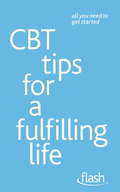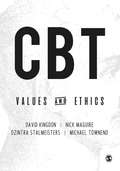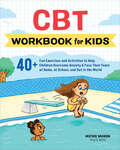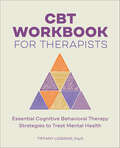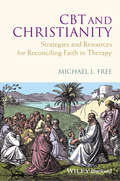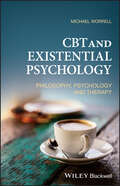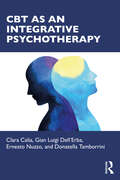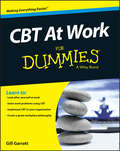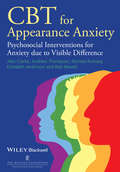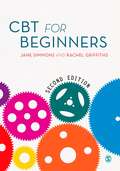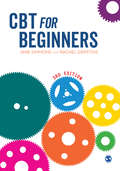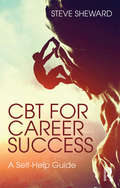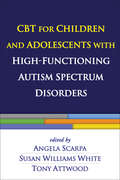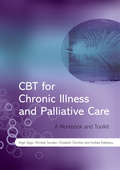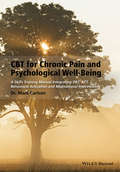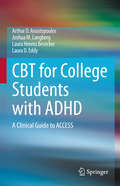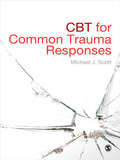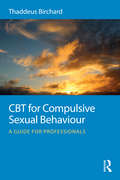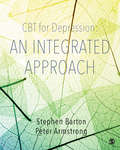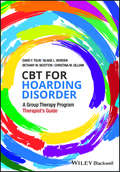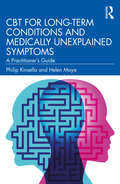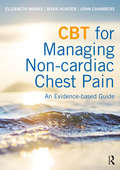- Table View
- List View
CBT Tips for a Fulfilling Life: Flash
by Windy DrydenThe books in this bite-sized new series contain no complicated techniques or tricky materials, making them ideal for the busy, the time-pressured or the merely curious. CBT Tips for a Happier Life is a short, simple and to-the-point guide to learning some basic Cognitive Behavioural Therapy skills that will help to boost your self-esteem, prevent negative thinking, and overcome self-defeating behaviour that might stop you reaching your goals. In just 128 pages you will discover a complete toolkit for making positive and lasting changes to your way of thinking and acting.
CBT Values and Ethics
by David Kingdon Michael Townend Dzintra Stalmeisters Nick MaguireReflecting the current legal, professional and cultural context of CBT practice this book provides therapists and counsellors with an understanding of both the values and ethics that accompany this approach. Providing real examples and reflective questions to encourage trainees to think about their own practice, this book takes the time to explain the principles and source of clinical ethics before focusing on the specific requirements for CBT users, including: CBT techniques Responsibilities to your client Competence Evidence It provides real examples and reflective questions to help you think about your own practice. This book will be your guide to CBT specific vales and ethics as you train and continue into practice.
CBT Values and Ethics
by David Kingdon Michael Townend Dzintra Stalmeisters Nick MaguireReflecting the current legal, professional and cultural context of CBT practice this book provides therapists and counsellors with an understanding of both the values and ethics that accompany this approach. Providing real examples and reflective questions to encourage trainees to think about their own practice, this book takes the time to explain the principles and source of clinical ethics before focusing on the specific requirements for CBT users, including: CBT techniques Responsibilities to your client Competence Evidence It provides real examples and reflective questions to help you think about your own practice. This book will be your guide to CBT specific vales and ethics as you train and continue into practice.
CBT Workbook for Kids: 40+ Fun Exercises and Activities to Help Children Overcome Anxiety & Face Their Fears at Home, at School, and Out in the World (Health and Wellness Workbooks for Kids)
by Heather Davidson Psy.D, BCNCBT strategies to help kids ages 6 to 10 stand up to anxiety and feel calmWorrying all the time can stop kids from having fun with friends, hobbies, sports, or school. The CBT Workbook for Kids helps them get back to doing the things they love. The ideas and activities inside use proven, up-to-date cognitive behavioral therapy (CBT) strategies to help manage—or even change—worried thoughts and feelings.This CBT workbook is an emotional toolbox for any anxious child, full of methods to help lower anxiety. First it helps them figure out what's going on in their heads, and then it gives them tools to change it. Fun quizzes, drawing challenges, and fill-in-the-blank exercises show them new ways to look at each worry.Explore CBT for kids with:Helpful skills—Learn techniques for expressing feelings, dealing with anger, staying focused, and making smart decisions.Relaxation strategies—Discover everyday calming methods, like creating a morning routine, asking for help, and facing fears a tiny bit at a time.Experiences from other kids—Each chapter in this CBT workbook has stories about how other kids might experience anxiety, too.Helps kids take a deep breath, face their fears, and win with this anxiety workbook for kids!
CBT Workbook for Therapists: Essential Cognitive Behavioral Therapy Strategies to Treat Mental Health
by Tiffany LogginsRetrain the brain and regulate behavior with CBT Cognitive behavioral therapy (CBT) can be transformative in the treatment of many mental health disorders. The CBT Workbook for Therapists shows both clinicians and patients how CBT can be used to develop healthy coping skills, alter thinking patterns, and ultimately help people live happier lives.What sets this CBT workbook apart:Overview of CBT—Delve into the fundamental principles of CBT and discover the vital connections between thoughts, feelings, and behaviors.Effective exercises—Explore 100 different strategies and exercises proven to be highly constructive in helping individuals learn how to shift their perspective and replace unhealthy behaviors.A range of clinical issues—From anger management to anxiety, this workbook addresses a variety of mental health concerns and allows readers to tailor these strategies to specific diagnoses.Harness the power of CBT and improve your mental health treatment starting today.
CBT and Christianity
by Michael L. FreeWhile Cognitive Behavioral Therapy (CBT) is an empirically-supported treatment, many behavioral and analytical psychotherapists also recognize the healing potential of religious belief. CBT and Christianity offers CBT therapists an authoritative, practical, and comprehensive resource for counseling clients with an allegiance to the Christian faith. This innovative new treatment approach compares the teachings of Jesus to contemporary cognitive therapies, describing a variety of successful assessment and treatment approaches with Christian clients by incorporating the teachings of Jesus into logical thinking, schema modification, and committed behavior change. Clarity is further enhanced through a variety of specific examples, descriptions of generic methods, and supplemental resources provided by the author. By combining effective treatments with sensitivity to religious convictions, CBT and Christianity offers innovative insights into the spiritual and psychological well-being of clients with Christian beliefs.
CBT and Existential Psychology: Philosophy, Psychology and Therapy
by Michael WorrellCBT and EXISTENTIAL PSYCHOLOGY Explore the possibilities and challenges of bringing two highly diverse disciplines—CBT and existential therapy—into dialogue In CBT and Existential Psychology: Philosophy, Psychology and Therapy, distinguished clinical psychologist Dr Michael Worrell delivers a singular exploration of the relationship between diverse forms of contemporary cognitive behaviour therapy and existential phenomenology. Written for both experienced and beginning CBT therapists, as well as therapists who practice from an existential perspective, this book clarifies and discusses the potential and challenges presented when these two different schools of thought and practice are brought into dialogue. The author outlines, in accessible fashion, the implications and possibilities offered by the combination of CBT and existential practice. He also presents a series of discussions with the highly experienced CBT therapists, researchers, and trainers, Tomas Heidenreich and Alexander Noyon, and existential therapy leader Ernesto Spinelli. The book includes a series of “existential reflections” and experiential exercises to allow the reader to develop an understanding of descriptive phenomenological approaches to therapeutic conversations. Readers will also find: A thorough introduction to existential philosophy, psychology, and therapy, including the theory and practice of existential therapy Comprehensive discussions of cognitive and behavioural psychotherapies, including Beckian CBT, schema-focused therapies, and constructivist, narrative, and postmodern CBT In-depth explorations of existential challenges and contributions to therapy, including discussions of anxiety, possibility, and uncertainty Enlightening dialogues on CBT and existential psychology with Tomas Heidenreich, Alexander Noyon, and Ernesto Spinelli Perfect for beginning and advanced CBT and existential therapists, CBT and Existential Psychology: Philosophy, Psychology and Therapy will also earn a place in the libraries of trainee clinical and counselling psychologists, as well as integrative and humanistic psychotherapists.
CBT as an Integrative Psychotherapy
by Clara Calia Gian Luigi Dell'Erba Ernesto Nuzzo Donatella TamborriniCBT as an Integrative Psychotherapy explores the current key themes, approaches, and interventions in psychotherapy. Developed and based on a dialogue between trainee psychotherapists, colleagues, collaborators, and scholars, this book integrates theoretical and technical aspects of psychological interventions. Chapters link theory and practice and provide philosophical insights in an accessible and discursive manner. The authors conduct a thoughtful analysis of psychotherapy and cover several topics including conflict, acceptance, self-esteem, and pseudo psychology. This book is discursive in nature and essential reading for novice and more experienced therapists. The integrative approach used throughout will allow trainees and practitioners to discover a coherent theoretical and practical framework for helping a diverse range of clients.
CBT at Work For Dummies
by Gill GarrattNip workplace stress in the bud with CBT Packed with useful tips that make it easy to incorporate CBT-Cognitive Behavioral Therapy- into your working day, CBT at Work For Dummies helps you reap the benefits of a more focused working life. You'll discover how integrating CBT at work promotes improved productivity and concentration, lower staff turnover, enhanced employer/employee and client relationships, reduced cost of staff absenteeism caused by illness, injury, stress, and more. An alarming number of individuals in the UK and across the globe suffer from work-related stress, some to the point of experiencing illness. The good news is, Cognitive Behavioural Therapy-often associated with treating acute mental health conditions-is finding its way into the workplace, where it's being used as a way to combat one of the most common occupational health issues: stress. In this friendly and accessible guide, you'll find everything you need to put CBT into practice today, whether you're in charge of managing employee wellness or just want to find a positive and productive way to get through the workday yourself. Answers the call of business leaders seeking creative solutions to enhance productivity and minimize the effects of stress in the workplace Offers employees trusted ways to be more effective in the workplace while reducing personal stress levels Arms learning and development professionals with the know-how to apply mindfulness meditation in the workplace Details the benefits of making CBT a part of your business plan If you're an employer looking to get the best out of your staff or an employee interested in reducing stress and anxiety whilst achieving an enhanced performance at work, CBT at Work For Dummies can help.
CBT for Appearance Anxiety: Psychosocial Interventions for Anxiety due to Visible Difference
by Robert Newell Andrew R. Thompson Elizabeth Jenkinson Nichola Rumsey Alex ClarkeThis clinical manual provides a CBT-based psychosocial intervention for use with individuals distressed about their appearance due to a disfigurement from birth, accident or illness, or those coping with another visible difference. Contains a wealth of case material with specific relevance to physical health conditions that affect appearance, practical advice on assessment, and session-by-session guidance for addressing common issues Written by leading academics and clinicians working in the management of disfigurement and rational appearance anxiety Uses a flexible stepped-care model that allows for use by experienced CBT practitioners as well those wishing to deliver a more basic psychological intervention Identifies the psychological factors involved in appearance anxiety while also addressing the practical concerns of living with a visible difference, such as managing the reactions of others
CBT for Beginners
by Jane Simmons Rachel Griffiths'Simmons and Griffiths provide a well thought-out introduction to the subject area of standard CBT. This text should be on the shelves of trainee cognitive behavioural psychotherapists for a considerable time to come' - Dr Alec Grant, University of Brighton This practical guide to cognitive behaviour therapy (CBT) will interest a wide range of professionals and trainees across health and social care. Focusing on case formulation, the authors show how to build a 'picture' of each individual client, using their case history to inform interventions. The book covers the fundamentals of practicing CBT such as: - the CBT model and how to explain it to clients - CBT assessment and formulation - cognitive and behavioural interventions Packed full of practical features like exercises, case dialogue and therapy materials, the book also covers a range of extra topics including: - Assessing referrals for suitability - Working with motivational issues - Getting the most out of supervision. - Managing therapeutic endings. Given the abundance of CBT texts available and the host of theoretical and conflicting positions that have arisen, it can be difficult for trainees to get to grips with the practical skills necessary to carry out CBT effectively. The book addresses this by equipping the CBT therapist with the essential nuts and bolts to practice CBT with confidence. Dr Jane Simmons and Dr Rachel Griffiths are practising NHS Adult Mental Health Clinical Psychologists.
CBT for Beginners
by Jane Simmons Rachel GriffithsThis book provides the ideal starting point for trainees and practitioners needing a no-nonsense, clear guide to the basics of CBT. It will equip them with the knowledge and know-how, covering all the main theory and competencies to help them practice CBT effectively and confidently. Focusing on case formulation, the authors show readers how to build a 'picture' of each client, using their case history to inform interventions. Features such as exercises, case dialogues, summary boxes, and further reading lists help to enhance and cement learning. This third edition includes updated references, further reading and exercises, and new content on: · The difficulties and drawbacks of CBT · The differences between formal CBT and informal CBT · The therapeutic relationship · Further discussion of specific formulations · Compassionate interventions with negative thoughts.
CBT for Beginners
by Jane Simmons Rachel GriffithsThis book provides the ideal starting point for trainees and practitioners needing a no-nonsense, clear guide to the basics of CBT. It will equip them with the knowledge and know-how, covering all the main theory and competencies to help them practice CBT effectively and confidently. Focusing on case formulation, the authors show readers how to build a 'picture' of each client, using their case history to inform interventions. Features such as exercises, case dialogues, summary boxes, and further reading lists help to enhance and cement learning. This third edition includes updated references, further reading and exercises, and new content on: · The difficulties and drawbacks of CBT · The differences between formal CBT and informal CBT · The therapeutic relationship · Further discussion of specific formulations · Compassionate interventions with negative thoughts.
CBT for Career Success: A Self-Help Guide
by Steve ShewardCBT for Career Success is a unique self-help book, offering a powerful combination of cognitive and behavioural therapy (CBT) approaches alongside career coaching for the first time. Whether you are just starting out in your career, aiming at a more senior position or considering a change in direction, this book is for you. If you want to succeed in the labour market, you need a psychological edge to help you progress in an increasingly competitive and volatile job market. This book provides powerful CBT approaches that will strengthen your resilience and motivation and increase the sheer excitement and enjoyment of achieving success in the workplace. The book provides clear, practical strategies and a wealth of materials that will help you to define your personal values and match them with suitable career choices, use psychological and motivational techniques to succeed in a competitive environment and deal effectively with work-related stress. The materials included within this book have been used on training courses delivered to hundreds of careers counsellors and coaches in different parts of England in recent years and have helped them to support their clients more effectively. CBT for Career Success will be of interest to all those wishing to succeed in their chosen careers, including new entrants to the labour market.
CBT for Children and Adolescents with High-Functioning Autism Spectrum Disorders
by Tony Attwood Susan Williams White Angela ScarpaThis book helps clinicians harness the benefits of cognitive-behavioral therapy (CBT) for children and adolescents with high-functioning autism spectrum disorders (ASD). Leading treatment developers describe promising approaches for treating common challenges faced by young people with ASD--anxiety and behavior problems, social competence issues, and adolescent concerns around sexuality and intimacy. Chapters present session-by-session overviews of each intervention program, review its evidence base, and address practical considerations in treatment. The book also discusses general issues in adapting CBT for this population and provides a helpful framework for assessment and case conceptualization informed by DSM-5.
CBT for Chronic Illness and Palliative Care
by Michelle Sowden Andrea Edeleanu Elizabeth Chorlton Nigel SageThere is a growing awareness of the need to address the psychological distress associated with physical ill health; however, current resources are limited and difficult to access. The best way to tackle the issue is by enhancing the skills of those professionals who have routine contact with them. CBT provides the evidence-based skills that most readily meet these requirements in a time and cost efficient manner. Based on materials prepared for a Cancer Network sponsored training programme and modified to address the needs of a larger client population of people experiencing psychological distress due to physical ill-health, this innovative workbook offers a basic introduction and guide to enable healthcare professionals to build an understanding of the relevance and application of CBT methods in everyday clinical practice.
CBT for Chronic Pain and Psychological Well-Being
by Mark CarlsonThe first clinical manual of evidence-based CBT skills for managing psychological issues associated with chronic pain, drawn from current approaches such as DBT, ACT, and motivational interviewing.The first skills training manual in the field of chronic pain and mental health disorders to provide an integrated session-by-session outline that is customizable for cliniciansAdaptive and evidence-based - integrates skill sets from DBT, ACT, Behavioral Activation, and Motivational Interviewing to address the unique needs of individual chronic pain sufferersClinicians can import the approach into their work, selecting the most appropriate skills and sessions, or create an entire therapeutic program with the manual as its foundationIncludes invaluable measurement and tracking tools for clinicians required to report outcomes
CBT for College Students with ADHD: A Clinical Guide to ACCESS
by Arthur D. Anastopoulos Joshua M. Langberg Laura Hennis Besecker Laura D. EddyThis book provides an overview of the ACCESS program, a mental health program that has been developed and tested as an efficacious treatment for college students with ADHD. This program is at the cutting edge of clinical research, incorporating treatment strategies that allow for dissemination in real world settings in order to effectively assist college students experiencing difficulties in their academic, personal, social, and emotional functioning. As cognitive behavioral approaches have proved to be the most successful psychological treatments to date, the techniques in this volume follow that model in a detailed and nuanced fashion. The authors provide a week by week breakdown of the program, supplemented by handouts and worksheets designed to facilitate better understanding of the areas targeted by the program. Filling a notable gap in research addressing the ADHD college student population, CBT for College Students with ADHD is a crucial resource for campus mental health practitioners as well as a broad range of clinicians dealing with emerging adults.
CBT for Common Trauma Responses
by Michael J ScottThis is the first book to show how to use cognitive behavioural therapy (CBT) with the full spectrum of post-traumatic responses; exploring how they affect and relate to one another. Focusing not only on co-morbidity with other anxiety disorders and depression, the book looks more widely at, for example, co-existing pain, substance abuse and head injury. After discussing how to tailor CBT practice to work most effectively with trauma responses in real-world settings, Michael J Scott goes on to explore the step-by-step treatment of post-traumatic stress disorder, other commonly occurring disorders and, finally, secondary traumatisation. Those training to work with young people, or already doing so, will find the focus in Part Three on CBT with traumatized children invaluable.
CBT for Compulsive Sexual Behaviour: A guide for professionals
by Thaddeus BirchardIncreasing numbers of therapists are coming into contact with the problem of compulsive sexual behaviour disorders. However, it is still a relatively new field and there is little in the current literature available that enables the therapist to work with and treat this problem. CBT for Compulsive Sexual Behaviour: A guide for professionals addresses this by providing a guide to cognitive-behavioural theory and practice which includes the assessment, diagnosis and treatment of addictive sexually compulsive disorders. Beginning with a description of addictive sexuality and an overview of cognitive behavioural therapy in which CBT is presented as the most useful response, Thaddeus Birchard provides clear therapeutic information about the implementation of CBT treatment intervention. The chapters included cover the neuroscience that underpins the addictive process; a ‘how to’ chapter on the use of groups; paraphilias; trauma and attachment; comorbid disorders and cross-addictions and analysis on the function of internet pornography, all written from a cognitive behavioural stance. Using case vignettes throughout, Thaddeus Birchard draws on his own experience as a psychosexual therapist, along with the latest research in the field, to enable the therapist to treat a range of compulsive sexual problems in a way that can be applied in individual practice or in a group setting as well as how to prevent relapse. This book will be essential reading for psychosexual therapists, cognitive behaviour therapists and other professional working with sexual compulsive disorders.
CBT for Depression: An Integrated Approach
by Peter Armstrong Dr Stephen BartonThis book introduces an approach to CBT for depression that integrates cognitive-behavioural models, evidence and therapies. Rooted in evidence-based practice and practically focused, it draws on components of first, second and third-wave CBT to help readers tailor therapy to the needs of individual clients. There is a particular focus on challenging presentations: the authors equip students with the skills to work with different depression sub-types, co-morbid disorders and a broad range of bio-psychosocial factors that can complicate depression and its therapy. Linking theory, evidence and case illustrations, the authors provide a wealth of practical tips that support clinical practice. In-depth cases studies and client contributions add further depth to this rich and stimulating book. This book is relevant to those taking postgraduate training courses in mental health such as CBT therapists, counsellors, nurses, clinical psychologists, occupational therapists, social workers and psychiatrists.
CBT for Depression: An Integrated Approach
by Peter Armstrong Dr Stephen BartonThis book introduces an approach to CBT for depression that integrates cognitive-behavioural models, evidence and therapies. Rooted in evidence-based practice and practically focused, it draws on components of first, second and third-wave CBT to help readers tailor therapy to the needs of individual clients. There is a particular focus on challenging presentations: the authors equip students with the skills to work with different depression sub-types, co-morbid disorders and a broad range of bio-psychosocial factors that can complicate depression and its therapy. Linking theory, evidence and case illustrations, the authors provide a wealth of practical tips that support clinical practice. In-depth cases studies and client contributions add further depth to this rich and stimulating book. This book is relevant to those taking postgraduate training courses in mental health such as CBT therapists, counsellors, nurses, clinical psychologists, occupational therapists, social workers and psychiatrists.
CBT for Hoarding Disorder: A Group Therapy Program Therapist's Guide
by Bethany M. Wootton Blaise L. Worden Christina M. Gilliam David F. TolinPart of a two-component product with a companion client workbook, CBT for Hoarding Disorder: Therapist's Guide guides group leaders through a comprehensive CBT group program for patients struggling with hoarding disorder. Provides step-by-step, evidence-based guidance for treating hoarding disorder (HD) with a focus on proven methods for behavior change rather than complex cognitive interventions Contains the latest research on HD and emphasizes the cognitive, emotional, and motivational factors involved in discarding and decision-making Features an accessible, straightforward client workbook with coping cards that summarize key lessons, homework assignments, motivational tools, and practice exercises for decision-making and emotion regulation skills Easy to implement without home visits for professionals and group leaders of all educational backgrounds across a wide variety of treatment settings and disciplines
CBT for Long-Term Conditions and Medically Unexplained Symptoms: A Practitioner’s Guide
by Philip Kinsella Helen MoyaCBT for Long-Term Conditions and Medically Unexplained Symptoms describes how cognitive behavioural therapy (CBT) can be used to treat anxiety and depression with a co-morbid long-term physical health condition (LTC) or medically unexplained symptoms (MUS). The book teaches cognitive behavioural therapists and other clinicians to help patients deal with the psychological aspects of physical symptoms, whatever their cause. It is divided into three parts, beginning with core skills for working with people with LTC and MUS. This includes assessment, formulation and goal setting. Part II focuses on CBT for LTC and includes chapters on low intensity interventions, working with depression and anxiety using protocols, and a consideration of an identity and strengths-based approach to working with LTC. The final part provides details of a formulation driven approach to working with MUS, broken down into individual chapters on working with behaviours, cognitions and emotions. With numerous case examples, the book provides accessible and practical guidance for mental health professionals, particularly CBT practitioners, working with anyone with long-term conditions or MUS.
CBT for Managing Non-cardiac Chest Pain: An Evidence-based Guide
by John Chambers Elizabeth Marks Myra HunterCBT for Managing Non-cardiac Chest Pain is an evidence-based guide and workbook for clinicians working with people with non-cardiac chest pain (NCCP). NCCP affects around 25–30% of people in the UK, USA, and Europe and is associated with high levels of health care use and compromised quality of life. This is the first book to describe a treatment programme to fill the gap in care for patients. The authors have developed and researched a novel approach that demonstrates how physiological, cognitive, behavioural and social factors all contribute to the negative experience of chest pain. With the help of exercises and downloadable handouts for the patient, the book aims to provide the necessary information and clinical skills and approaches for clinicians to use in health care settings. CBT for Managing Non-cardiac Chest Pain will appeal to anyone involved in the care of patients with NCCP, including nurses; general practitioners; cardiologists; acute medical physicians and psychologists.
